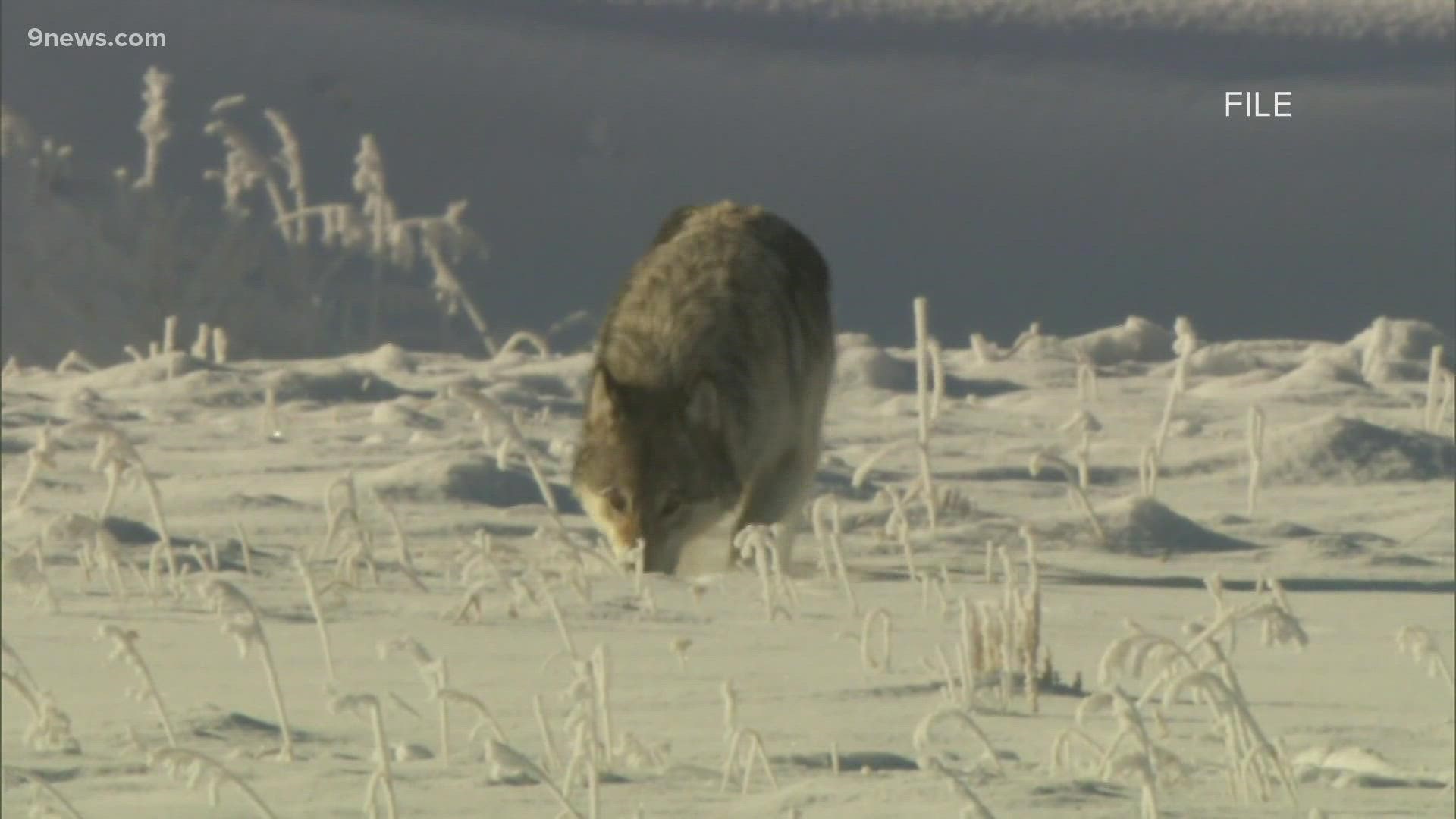DENVER — The news that wolves killed a domestic calf on a Jackson County ranch last week has raised questions about a 2020 ballot initiative passed by Colorado voters for the reintroduction of wolves in the state.
But the wolves that killed that calf were not reintroduced to Colorado under Proposition 114. In fact, no wolves at all have been reintroduced so far under the initiative, which directed Colorado Parks and Wildlife (CPW) to develop a plan to bring the predators into Colorado west of the Continental Divide.
Wolves occasionally cross state lines. CPW identified as many as six wolves in Colorado in 2020. This past summer, wildlife officials confirmed that two wolves that had dispersed to Colorado had mated and produced a litter of pups in Jackson County.
Here are answers to some questions on wolves in Colorado, courtesy of Colorado Parks and Wildlife.
Have wildlife officials reintroduced wolves in Colorado?
The short answer is no.
Under Proposition 114, passed by Colorado voters in November 2020, CPW must develop a plan for wolf reintroduction no later than Dec. 31, 2023, on designated lands west of the Continental Divide and pay fair compensation for livestock losses caused by wolves.
"That plan does not exist today, but will be developed using the best available scientific, economic, and social considerations," CPW says on its website.
CPW created a Technical Working Group and a Stakeholder Advisory Group to advise CPW and develop a reintroduction plan.
The Technical Working Group is holding monthly virtual meetings that started in June and will continue through next June.
The stakeholder group started holding monthly meetings in June on the Western Slope and on the Front Range, and it has several more meetings planned through next June.
A CPW spokesperson said the agency expects a draft plan by late 2022 or early 2023, which will be followed by a public comment period.
When a plan for reintroduction has been developed and approved, CPW will be responsible for carrying it out.
Are there wolves in Colorado?
Until this year, the last known resident wolves in Colorado were here in the 1940s. But two wolves that migrated separately to the state in 2019 and 2021 produced a litter of pups this past summer in Jackson County.
Wolf F1084, a female collared gray wolf ("Jane"), has been living in Jackson County since 2019.
The male wolf, M2101 ("John") was collared by CPW in January 2021 after being spotted traveling with F1084.
The mated pair had six pups this past summer, meaning the current pack has eight wolves.
This is the pack that CPW thinks killed the calf in northwest Colorado.
How many wolves are in Colorado?
CPW said it doesn't have a specific population count but that they get about 100 reports of sightings per year. Confirmed or probable wolf sightings have happened in 2004, 2007, 2009, 2015, 2019, 2020 and 2021.
Other than the Jackson County pack, six wolves were spotted in Moffat County in 2020. Only months later, state wildlife officials learned that hunters just across the state line in Wyoming likely killed three members of the pack.
RELATED: 6 wolves seen in northwest Colorado
Where are the wolves coming from?
The female wolf F1084 came from the Wyoming's Snake River pack. It's unclear where the male, M2101, dispersed from, though CPW thinks it also dispursed from Wyoming.
Most dispersals into Colorado are believed to have come from the Greater Yellowstone Area, according to CPW.
Over the past decade, the U.S. Fish and Wildlife Service (USFWS) has reintroduced wolves into Wyoming, Idaho, New Mexico and Arizona.
Is it illegal to kill a wolf?
The USFWS removed federal protections for gray wolves in 2020.
Gray wolves are still a state endangered species, and they can't be taken for any reason other than self-defense, according to CPW.
That includes landowners whose livestock gets killed by a wolf.
Illegally taking a wolf might result in a combination of penalties, including fines of up to $100,000, a year of jail time, and a lifetime loss of hunting license privileges.
CPW is responsible for handling any wolf that kills livestock.
Are landowners compensated for wolf depredation?
Yes, they are.
The incident last week in Jackson County was the first confirmed wolf depredation incident in 70 years in Colorado.
Wolves typically prey on wildlife such as elk, but there are rare times when they feed on livestock, CPW said.
"The state has an existing depredation reimbursement fund for predation by other species that can be used for wolf depredation, and depredation reimbursement options specifically related to wolf reintroduction are currently being evaluated by both the technical advisory group and stakeholder advisory group working to develop reintroduction plan recommendations," according to CPW.
The current depredation fund is also for reimbusement for incidents with mountain lions and bears. CPW is in the process of formalizing an official process for livestock damage specific to wolf depredation.
SUGGESTED VIDEOS: Latest from 9NEWS

